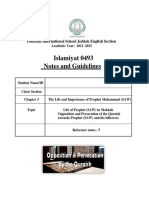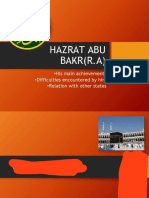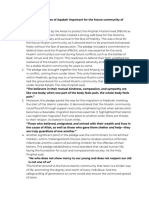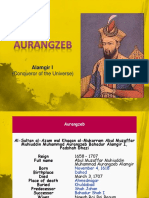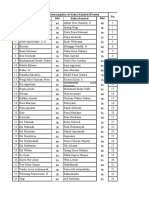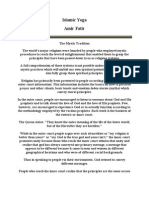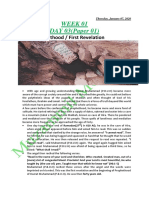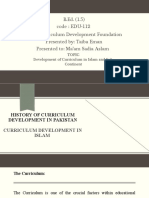Relationship of The Prophet With Non-Muslims (MS), M.Arsalan Sajid
Relationship of The Prophet With Non-Muslims (MS), M.Arsalan Sajid
Uploaded by
Soha SohailCopyright:
Available Formats
Relationship of The Prophet With Non-Muslims (MS), M.Arsalan Sajid
Relationship of The Prophet With Non-Muslims (MS), M.Arsalan Sajid
Uploaded by
Soha SohailOriginal Title
Copyright
Available Formats
Share this document
Did you find this document useful?
Is this content inappropriate?
Copyright:
Available Formats
Relationship of The Prophet With Non-Muslims (MS), M.Arsalan Sajid
Relationship of The Prophet With Non-Muslims (MS), M.Arsalan Sajid
Uploaded by
Soha SohailCopyright:
Available Formats
Relationship of the Prophet ﷺwith Non-Muslims
Relationship of the Prophet ﷺwith Quraish in Makkan’s Life
Question # 1(a)
❖ The Prophet’s ﷺrelationship with the Quraysh changed after he began to
receive revelations. Describe the differences in the way the Quraysh treated
him after this event. [10] (May/June 2018 12)
❖ Write about the changes in the relationship between the Prophet ﷺand the
Quraysh in the years between his marriage to Khadija and the death of Abu
Talib. (May/June 2015 11)
❖ Write about the Prophet Muhammad’s ﷺinteraction with the Quraysh while
he lived in Makkah, before and after revelation. (Oct/Nov 2011 11)
Good answers will be able to provide a detailed and concise narrative of events that
occurred between the Prophet ﷺand the Quraysh.
Candidates should talk about the Prophet’s ﷺstatus in the community prior to him
becoming a prophet.
He was known as ‘Al-Amin’ or the trustworthy.
Candidates should mention, using examples, that prior to his prophethood, the
Quraysh used to consult him in important matters, trust him with their goods, and
look to him for advice.
For example, they could mention that when the Prophet ﷺwas younger, he was
chosen by the Quraysh to settle the dispute of who should replace the sacred black
stone to its position at the Ka’ba.
Answers should also mention that after revelation, the Prophet Muhammad ﷺwas
rejected when he invited the Quraysh to Islam, especially by his uncle Abu Lahab.
They still trusted him but did not want to believe in his message.
He was taunted, mocked and openly humiliated by different members of the
Quraysh.
The best answers will include details of events before the period of revelation and
after revelation.
Candidates should not mention only one or two events, such as the boycott, but give
a wider narrative of events before and after prophethood.
Details about the events themselves should be credited. Answers should write about the
Prophet’s ﷺstatus in the community prior to Islam and after. A comparative approach
will likely score higher.
Page1|7 Islamiyat with Muhammad Arsalan Hussaini
(b) The Prophet ﷺdid not change his character despite the way the Quraysh
changed towards him. What can Muslims learn from this? [4] (May/June 2018 12)
Some lessons could be that Muslims should know how to develop good character
traits and not change them, whatever the situation.
That when people are trying to make difficulties in your life, you should try your
best to keep good relations with them rather than reacting in a negative way with
them in return.
That God looks at what you do and will help you when you remain patient.
These are just some suggestions. Candidates can use others but try to explain their
answers and say why the answers they give are good lessons in life.
(b) Why is it significant that the Quraysh were still willing to keep their belongings
with the Prophet ﷺafter he started to preach Islam? [4] (May/June 2015 11)
Candidates can offer a variety of answers, but they should try to explain their answers
with reasoning.
They could say that despite the message he was preaching, they still knew that his
character would not have changed because they had never found any discrepancies
in his character.
Despite not liking what the Prophet ﷺwas saying they still valued their belongings
and wanted to keep them where they knew they would get them back.
The reasons the Quraysh changed were political and social, not because the
Prophet ﷺhad changed, or because they felt he was lying/spreading falsehood.
(b) Why did the Quraysh feel they needed to reject the Prophet’s ﷺmessage? [4]
(Oct/Nov 2011 11)
Good answers here will be able to mention that the Quraysh had their own belief
system and that they worshipped many idols opposed to the Prophet Muhammad’s
ﷺmessage of monotheism.
By changing their ways, they faced losing their status and position as leaders and
keepers of the Ka’ba.
They also faced losing income, felt threatened by the Prophet’s ﷺinfluence upon
the youth of Makkah, and his growing support.
This should not just be a description of the reasons; candidates should include evaluation.
Page2|7 Islamiyat with Muhammad Arsalan Hussaini
Question # 2 (a)
❖ The Prophet ﷺwas mistreated by the Makkans after preaching the message of
Islam. Write an account of the difficulties he faced. [10] (Oct/Nov 2020 12)
❖ The Prophet Muhammad ﷺbrought the message of Islam to Makkah. Describe
the ways the main clans treated him after hearing his message.
(Oct/Nov 2018 11)
Candidates should write a detailed account of the difficulties faced by the Prophet ﷺ
himself.
Candidates could give a brief description of the Prophet ﷺbeginning to preach
openly after years of secret worship, inviting his kinsmen of Banu Hashim to
Islam but getting a cold response from them to his call.
When Prophet ﷺbeginning to preach openly after years of secret worship and
announced his faith to the Quraysh on mount Safa, they rejected his call to Islam,
and subsequently went on to mock and torture the Prophet ﷺ.
Abu Lahab, in particular, spoke harshly and subsequently went on to mock and
torture the Prophet ﷺ. He was called a mad man, or possessed by jinn [15.6,
68.51];
Abu Lahab forced his two sons to divorce the Prophet’s daughters Ruqayya and
Umm Kulthum.
They laughed and mocked him after his son’s death, calling him ‘abtar’, cut off
and when there was a break in revelations.
Gradually as Islam started spreading, leaders of different tribes such as Banu
Makhzum escalated the persecution against Prophet.
Abu Jahal was the most prominent Makkan who committed many atrocities
against the Prophet ﷺon several occasions including physically attacking and
inciting others to do the same.
Abu Jahl had the fetus of a she-camel placed on the Prophet’s ﷺback while he
was praying at the Ka’ba, which was removed by Fatima.
Rubbish and thorny bushes were thrown at him/in his path. His followers were
also persecuted which hurt the Prophet too.
The Prophet ﷺ, his followers and clans were boycotted and were not allowed
business dealings or social contact with the Makkans; they stayed in Shib-e-Abi
Talib for three years, where they had little food or water.
Some candidates might also refer to the pressure put on Abu Talib to withdraw
support of the Prophet ﷺand the bribery offer made by the Quraysh and when all
failed, planned to assassinate the Prophet ﷺwhich eventually led to his migration.
Page3|7 Islamiyat with Muhammad Arsalan Hussaini
(b) How can the Prophet’s ﷺresponse to opposition help Muslims when they are
mistreated? [4] (Oct/Nov 2020 12)
Candidates could say that they can take from the Prophet’s ﷺresponse that they
should be patient and kind, and not retaliate to other people’s behavior.
That in their everyday lives they may be mocked or bullied for different reasons,
but they should try to remain patient.
Showing perseverance and steadfastness with a strong belief in God’s help, in the
face of any hardship, is another way Muslims can respond.
Better answers will give specific examples of lessons Muslims can take in certain
circumstances.
(b) Why did the Quraysh fear the Prophet ﷺand his message even though he was
not violent or aggressive towards them? [4] (Oct/Nov 2018 11)
They feared him because they knew he was honest and trustworthy and so he
already had a good standing with people, therefore they were more likely to
believe him.
They also feared that he was just and treated people the same, and they did not
want to have the same status as slaves/women/children.
They feared his message as it meant believing in one God and not the many idols
of the Ka’ba, which meant they may have lost their source of income.
Page4|7 Islamiyat with Muhammad Arsalan Hussaini
Relationship of the Prophet ﷺwith non-Muslims in Madani Life
Question # 3(a)
❖ Write about the way in which the Prophet interacted with non-Muslims after
his move to Madina. [10] (Oct/Nov2016 11)
❖ Write about the Prophet Muhammad’s ﷺinteraction with non-Muslims in
Madina. (May/June 2013 41)
Candidates should only write about the Prophet’s ﷺinteraction with non-Muslims
once he had migrated to Madina, and not write about events before this time.
Candidates could write about how the Prophet ﷺmade a Constitution for the
citizens of Madina, including non-Muslims, about their rights and responsibilities as
part of the community.
The non-Muslims had the following rights:
i. Equal political and cultural rights,
ii. Autonomy and freedom of religion;
iii. They would fight with the Muslims against the enemy of the community and
have the same responsibilities in war as others.
The Prophet ﷺwas always fair in his dealings with the non-Muslims, e.g., when a
Muslim and non-Muslim were having a dispute, the Prophet ﷺsided with the non-
Muslim as it was the just thing to do.
Candidates could also talk about the various Jewish tribes, and how their
relationships developed with the Prophet ﷺover time, as well as his relationship
with the hypocrites in Madina.
The Prophet ﷺengaged in commercial dealings with them and gave and received
help from them.
He sometimes borrowed money from Jews and also arranged for loans from them
for some of his companions: one day a Jew caught hold of the cloth the Prophet ﷺ
was wearing and demanded that he repay the loan he had taken from him. ‘Umar,
got angry with the Jew and scolded him. The Prophet ﷺthen ordered that the loan
be repaid to the Jew, and because ‘Umar had scolded him the Prophet ﷺinsisted that
he be given more money than what he had actually been owed.
Not everyone was happy with the Prophet’s ﷺleadership of Madina and individuals
from among the non-Muslim clans plotted to take the Prophet’s ﷺlife.
Two of the tribes – the Banu Nadir and the Banu Qaynuqa - were eventually exiled
for breaking the treaty and for the consequent danger they posed to the new Muslim
community.
Page5|7 Islamiyat with Muhammad Arsalan Hussaini
The Banu Qurayza also broke their treaty by siding with the Quraysh at the Battle of
the Trench.
They were dealt with in accordance to their own laws, which meant that many of
them were put to death.
Candidates could also mention that the Prophet ﷺsent letters to various non-Muslim
rulers inviting them to Islam.
The Christians of Najran visited the Prophet ﷺin Madina to talk to him and ask
questions.
They then signed a peace treaty. The Prophet ﷺallowed them to pray their prayers
in the mosque.
Candidates could also talk about his treatment of non-Muslims at the Conquest of
Makkah but this should not take up the bulk of the answer.
(b) How can Muslims now apply the lessons learnt from the Prophet’s ﷺinteraction
with non-Muslims? [4] (Oct/Nov2016 11)
(b) What can Muslims learn from this interaction? (May/June 2013 41)
(b) How can these examples help Muslims today in their relationships with non-
Muslims? (Oct/Nov 2009 01)
Candidates should show some reflection on the situations they have described in part (a)
and relate them to their own personal relationships with non-Muslims, or the relationship
of Muslims in general with non-Muslims.
They could talk about the moral significance of the Prophet’s ﷺactions and this should
be used to highlight Muslim conduct. A clear parallel should be drawn between the
Prophet’s ﷺexample and related situations, and specific examples given.
Non-Muslims were respected by the Prophet ﷺand invited to Islam.
If they did not accept it, they were left to live their lives freely under their own faith.
Muslims now can learn from this by inviting non-Muslims to Islam by teaching
them about the essentials of faith.
If they do not want to accept Islam then they should not be harassed or hurt, but
rather respected and looked after.
Muslims who kill people from other faiths because they do not believe in Islam, are
going against the example of the Prophet ﷺ.
Muslims should also enter into agreements with non-Muslims to ensure both sides
live amicably and do not have their freedoms taken away by the other side.
This allows both parties to know where they stand and do not have to live in fear.
Candidates can offer their own examples, and valid answers should be credited.
Page6|7 Islamiyat with Muhammad Arsalan Hussaini
Treatment of the Prophet ﷺwith non-Muslims
Question # 4
(a) Describe two events from the life of the Prophet ﷺthat illustrate the way he
treated non-Muslims. [10] (Oct/Nov 2009 01)
Candidates can choose any two events and give a full and concise description of them.
The point of the events should be underlined, as well as giving some reasons for the
prophet’s ﷺconduct. Some events which candidates could talk about (though not the
only ones) are:
His treatment of non-Muslims during the early persecution of Muslims in Makkah;
how he was taunted and had things thrown at him, and how he reacted
The story of the prophet going to Al-Ta’if; how they reacted to his message and
how the prophet reacted to them
The conquest of Makkah; his treatment of his non-Muslim enemies
His relationship with non-Muslims when they migrated to Madina; how he made
treaties with the Jewish tribes and his interaction with them.
There may be other relevant events that the candidates choose, which should be credited
if they give a detailed description of them.
Page7|7 Islamiyat with Muhammad Arsalan Hussaini
You might also like
- IGCSE Islamic Studies Chapter 1.7Document19 pagesIGCSE Islamic Studies Chapter 1.7Sana Ali100% (3)
- Chapter 3 Isl PDFDocument12 pagesChapter 3 Isl PDFdawood buttNo ratings yet
- Relationship of The Prophet With Non-Muslims (MS), M.arsalan SajidDocument5 pagesRelationship of The Prophet With Non-Muslims (MS), M.arsalan Sajidaairamansoor2000No ratings yet
- Opposition and Persecution by QuraishDocument13 pagesOpposition and Persecution by QuraishAbdul Hadi TahirNo ratings yet
- Prophet Ms2015 24Document50 pagesProphet Ms2015 24Amna AbbasiNo ratings yet
- Life As A Model of ExcellenceDocument10 pagesLife As A Model of ExcellencemaryamNo ratings yet
- Life in Makkah (Ancestor - Mairaj)Document6 pagesLife in Makkah (Ancestor - Mairaj)Affan Imran100% (1)
- ISLAMIC STUDIES SessionalDocument3 pagesISLAMIC STUDIES SessionalAilia ZahraNo ratings yet
- PPQS-Holy Prophet (SAW) and His Relation With The Non-MuslimsDocument7 pagesPPQS-Holy Prophet (SAW) and His Relation With The Non-MuslimsMuhammad MustafaNo ratings yet
- G 8 LESSON-4 VIDEOS+TEXT (Pledges of Aqaba)Document6 pagesG 8 LESSON-4 VIDEOS+TEXT (Pledges of Aqaba)Bosss246No ratings yet
- G 8 LESSON-2 VIDEOS+TEXT (Persecution and Migration To Abyssina) Third Term OnlineDocument7 pagesG 8 LESSON-2 VIDEOS+TEXT (Persecution and Migration To Abyssina) Third Term OnlineBosss246No ratings yet
- Questions of IslamiatDocument4 pagesQuestions of IslamiatAlex Jutt50% (2)
- Sample Questions Islamiyat Term 2Document15 pagesSample Questions Islamiyat Term 2sana khawajaNo ratings yet
- Persecution Agains FollowersDocument4 pagesPersecution Agains FollowersAhmed Qureshi100% (1)
- Makki Life P1 CHAPTER 3 (First Term)Document16 pagesMakki Life P1 CHAPTER 3 (First Term)Rabia AliNo ratings yet
- Importance of The Cave of Hira & PersecutionDocument5 pagesImportance of The Cave of Hira & Persecutionmariumf04No ratings yet
- Battle of Hunain and Other Battles Past PPR QuestionsDocument17 pagesBattle of Hunain and Other Battles Past PPR Questionssana khawajaNo ratings yet
- Marking Scheme Prophets PBUH LifeDocument62 pagesMarking Scheme Prophets PBUH LifeMinahil Javed75% (4)
- Preaching in IslamDocument7 pagesPreaching in IslamMuhammad Khalil100% (1)
- 1st Chapter Notes IGCSE IslmaiyatDocument2 pages1st Chapter Notes IGCSE IslmaiyatYahya AamirNo ratings yet
- Task 6.2Document3 pagesTask 6.2abdxjutt.editzNo ratings yet
- CALIPHS MS 2015 0nward 2058 IslamicDocument24 pagesCALIPHS MS 2015 0nward 2058 IslamicysfkinaziNo ratings yet
- Hazrat Abu Bakr Siddique R.A by Muhmmad Arsalan HussainiDocument8 pagesHazrat Abu Bakr Siddique R.A by Muhmmad Arsalan HussainiSoha SohailNo ratings yet
- ISLAMIAT 4 Marks QuestionsDocument16 pagesISLAMIAT 4 Marks QuestionsFizza FatimaNo ratings yet
- MS of Mock PaperDocument7 pagesMS of Mock PaperBilal SujelaNo ratings yet
- Isl Qs 1Document2 pagesIsl Qs 1hyeemysteryNo ratings yet
- Islamiyat 4 Marks QDocument87 pagesIslamiyat 4 Marks QshorafNo ratings yet
- Week 04 Day 03 P1 Online October 2020Document5 pagesWeek 04 Day 03 P1 Online October 2020Riemn FarhanNo ratings yet
- Islam: From God or Man? #1: Introduction. The Lord Warned of False Prophets Who Would Come inDocument6 pagesIslam: From God or Man? #1: Introduction. The Lord Warned of False Prophets Who Would Come inpeetersNo ratings yet
- Life in Makkah Main EventsDocument16 pagesLife in Makkah Main EventsMuhammad SharamNo ratings yet
- Marking Scheme - Prophet's (PBUH) LifeDocument76 pagesMarking Scheme - Prophet's (PBUH) LifesleepNo ratings yet
- Reason For MigrationDocument24 pagesReason For Migrationasep.spoNo ratings yet
- The Religion of IslamDocument28 pagesThe Religion of IslamKristine CapaoNo ratings yet
- Peradaban Islam Madinah: (Refleksi Terhadap Primordialisme Suku Auz Dan Khazraj)Document14 pagesPeradaban Islam Madinah: (Refleksi Terhadap Primordialisme Suku Auz Dan Khazraj)Naura ZalfaaNo ratings yet
- Peradaban Islam Madinah: (Refleksi Terhadap Primordialisme Suku Auz Dan Khazraj)Document14 pagesPeradaban Islam Madinah: (Refleksi Terhadap Primordialisme Suku Auz Dan Khazraj)Naura ZalfaaNo ratings yet
- PAST PAPERS MARKING SCHIME - Prophet's (SAW) LifeDocument98 pagesPAST PAPERS MARKING SCHIME - Prophet's (SAW) Life15evr005No ratings yet
- Four Caliphs of IslamDocument41 pagesFour Caliphs of IslamAbdullah AhsanNo ratings yet
- Chapter 4 - Uthman & Ali (RA)Document11 pagesChapter 4 - Uthman & Ali (RA)zqinab xNo ratings yet
- ISLAM IN THE BIBLE Final7Document18 pagesISLAM IN THE BIBLE Final7Abdnur IdrizaNo ratings yet
- Delegitimizing ISIS On Islamic Grounds CDocument49 pagesDelegitimizing ISIS On Islamic Grounds CNordin PumbayaNo ratings yet
- Biography of Hz. Fatima, Hassan, Hussain, Abu Bakar and his admintration as caliphDocument7 pagesBiography of Hz. Fatima, Hassan, Hussain, Abu Bakar and his admintration as caliphmellowkey14No ratings yet
- Marking Scheme Mock Exam Paper 1 MsDocument6 pagesMarking Scheme Mock Exam Paper 1 MsAreeba IqbalNo ratings yet
- Hazrat Abu BakrDocument28 pagesHazrat Abu Bakrzohra jabeenNo ratings yet
- Paper 01 Day 06 PP 2024Document14 pagesPaper 01 Day 06 PP 2024arshbehram81No ratings yet
- islamiyaatDocument7 pagesislamiyaatmanolomano132008No ratings yet
- The Rightly Guided CaliphsDocument33 pagesThe Rightly Guided Caliphsalinagarbn.no2No ratings yet
- Pledges and MairajDocument4 pagesPledges and MairajzoeNo ratings yet
- Opposition & PersecutionDocument7 pagesOpposition & PersecutionTazeen MuzammilNo ratings yet
- Hazrat ALiDocument3 pagesHazrat ALiIfrah RafaqatNo ratings yet
- 2 Al Baqarah - Tafseer by Abul Al MaududiDocument5 pages2 Al Baqarah - Tafseer by Abul Al MaududirnoordinNo ratings yet
- LIFE IN MAKKAHDocument13 pagesLIFE IN MAKKAHSports BroNo ratings yet
- CH 23, 24 Prophet Muhammad (5, 6)Document4 pagesCH 23, 24 Prophet Muhammad (5, 6)halinaaa98No ratings yet
- Sectarianism in Pakistan: Causes & Remedies: AbstractDocument42 pagesSectarianism in Pakistan: Causes & Remedies: AbstractŠÿêdà PäkëēžâNo ratings yet
- Life of The Holy Prophet (P.B.U.H)Document7 pagesLife of The Holy Prophet (P.B.U.H)Bakhtiar Azeem Soomro100% (1)
- G9 STBB English Book SolutionDocument28 pagesG9 STBB English Book SolutionIshrat KhanNo ratings yet
- HUM112 Handouts Lecture13Document4 pagesHUM112 Handouts Lecture13ziishanalixiomi43No ratings yet
- IMPORTANT LESSONS DERIVED FROM THE LIFE OF PROPHET Word FileDocument6 pagesIMPORTANT LESSONS DERIVED FROM THE LIFE OF PROPHET Word FileRizwan raziNo ratings yet
- Sir Muzamil Notes o Level IslamiaDocument10 pagesSir Muzamil Notes o Level IslamiaMuqeet Qaiser0% (1)
- The Essential WomenDocument61 pagesThe Essential WomenSARFRAZ ALINo ratings yet
- Moti Masjid DelhiDocument12 pagesMoti Masjid DelhiFahad KhanNo ratings yet
- Islamic Rulings On Organ TransplantDocument12 pagesIslamic Rulings On Organ TransplantKhan1081No ratings yet
- TaqlidDocument3 pagesTaqlidaaksialNo ratings yet
- Some Notes On The Transmission of AdīthDocument36 pagesSome Notes On The Transmission of AdīthScottie GreenNo ratings yet
- No. Daftar Nilai Tes Keterampilan Di Kelas Kontrol (Postes) No. Kelas Eksperimen Kelas KontrolDocument38 pagesNo. Daftar Nilai Tes Keterampilan Di Kelas Kontrol (Postes) No. Kelas Eksperimen Kelas KontrolGugum GumbiraNo ratings yet
- Daftar Pengurus BEM UNSOED 201Document5 pagesDaftar Pengurus BEM UNSOED 201Kang OoyNo ratings yet
- Reluctant Fundamentalist by AyeshaDocument12 pagesReluctant Fundamentalist by AyeshaAyesha MunirNo ratings yet
- Partition of IndiaDocument71 pagesPartition of IndiaShishir Kumar100% (1)
- Ppmbaitussalam: Staff Pengasuhan SantriDocument2 pagesPpmbaitussalam: Staff Pengasuhan SantriMuhammad Okto KholilullahNo ratings yet
- Islamic YogaDocument65 pagesIslamic Yogaephraim7100% (5)
- Week 01 Day 03 P1 January 2021Document2 pagesWeek 01 Day 03 P1 January 2021Waleed AftabNo ratings yet
- School of Law-Exeter University Islamic Law and Society LAW 2132-3132 DR Anicée Van Engeland 2011-12Document9 pagesSchool of Law-Exeter University Islamic Law and Society LAW 2132-3132 DR Anicée Van Engeland 2011-12Alexander Sebastian GorinNo ratings yet
- The Concept of Imamah According To The Shia and Its Inception - MahajjahDocument47 pagesThe Concept of Imamah According To The Shia and Its Inception - MahajjahSagar RazaNo ratings yet
- Pre EmptionDocument19 pagesPre EmptionShubhi MishraNo ratings yet
- A Mathematical Model For A Verse of The Holy Quran: Corresponding AuthorDocument27 pagesA Mathematical Model For A Verse of The Holy Quran: Corresponding AuthorNikIbrahimNikMatNo ratings yet
- Absen Ekskul Pilihan Peserta Didik Kelas XDocument17 pagesAbsen Ekskul Pilihan Peserta Didik Kelas XPokoke KenekNo ratings yet
- Naskah Kuno Dan Perkembangan Islam Di MALUKU Studi Kasus Kerajaan Hitu, Maluku Tengah Abad XVI-XIX M Old Manuscr..Document17 pagesNaskah Kuno Dan Perkembangan Islam Di MALUKU Studi Kasus Kerajaan Hitu, Maluku Tengah Abad XVI-XIX M Old Manuscr..Zakky-Amiin SiiPangerankecil d'LithiumNo ratings yet
- Letter From MeccaDocument2 pagesLetter From MeccaAli CetinkayaNo ratings yet
- Kedinasanid To Stan 2 PDFDocument4 pagesKedinasanid To Stan 2 PDFRachel Riris R DamanikNo ratings yet
- Jawshan KabeerDocument267 pagesJawshan KabeerneferisaNo ratings yet
- Barak AllahDocument11 pagesBarak AllahRicko Dwi Adi SaputraNo ratings yet
- Kekerasan Intelektual Dalam Islam (Telaah Terhadap Peristiwa Mihnah Mu'Tazilah)Document18 pagesKekerasan Intelektual Dalam Islam (Telaah Terhadap Peristiwa Mihnah Mu'Tazilah)MUCHAMMAD SABILUL KHAIR 2019No ratings yet
- History of Curriculum Development in PakistanDocument16 pagesHistory of Curriculum Development in PakistanMuhammad AslamNo ratings yet
- KALENDER PENDIDIKAN 2016-2017 - Ok PDFDocument1 pageKALENDER PENDIDIKAN 2016-2017 - Ok PDFYusuf SamiraNo ratings yet
- Riyaadus Saliheen Commentary Vol 3Document512 pagesRiyaadus Saliheen Commentary Vol 3Naghma Nundloll100% (2)
- Dhul Hijjah - Guide To The First 10 DaysDocument7 pagesDhul Hijjah - Guide To The First 10 DaysAsma JeelaniNo ratings yet
- THE BOOK ON THE SECRETS OF PILGRIMAGE (KITAB 'ASRAR AL-HAJJ) BY 'ABU HAMID MUHAMMAD AL-GHAZALI Translated BY IBRAHIM UMARDocument75 pagesTHE BOOK ON THE SECRETS OF PILGRIMAGE (KITAB 'ASRAR AL-HAJJ) BY 'ABU HAMID MUHAMMAD AL-GHAZALI Translated BY IBRAHIM UMARDawudIsrael1No ratings yet
- Congress Ministeries 1937Document66 pagesCongress Ministeries 1937inayyatNo ratings yet
- Garment What's and Why-EnglishDocument443 pagesGarment What's and Why-Englishislamakmfi100% (1)



